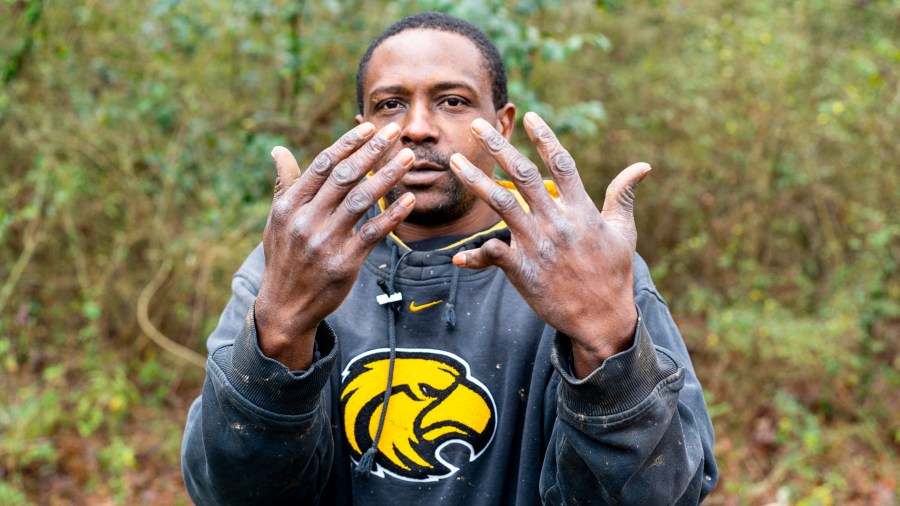You’re an essential worker. Do you get essential protections?

Every night, William McNeal hops in a van and heads out to several poultry farms around Central Mississippi to catch chickens.
McNeal and his crew get paid based on how many chickens they catch — grabbing them up by hand, by the thousands, and loading them into cages destined for processing plants. For every thousand small chickens his crew catches, he makes about $2.
McNeal is just one of hundreds of thousands of workers in America’s chicken supply chain, which processes about 64 pounds of chicken for every person in the United States each year, making it the most popular meat consumed in the U.S. The COVID-19 pandemic is exposing weaknesses in that supply chain — in particular, the protections, or lack thereof, for workers like McNeal.
“We’re putting our lives on the line to make sure everybody got food, in various places, to eat,” McNeal said.
In the van, as in the many chicken processing plants in this region, workers are crowded together. Companies have been slow to provide the kind of safety gear that could protect their staff from contracting the virus from co-workers. Until recently, paid sick leave was rare in the industry.
McNeal works for a subcontractor hired by Koch Foods, a major poultry company. Koch Foods owns the chickens and the processing plant, but it subcontracts the work of chicken catching to third-party companies. Koch Foods and McNeal’s employer — the subcontractor — didn’t respond to requests for comment.
Without these essential workers, U.S. meat supplies could be at risk; already, some grocers are limiting purchases of chicken and other meat. But there are no federal requirements for social distancing in meatpacking plants, according to Debbie Berkowitz, former chief of staff of the U.S. Occupational Safety and Health Administration and current safety and health program director at the National Employment Law Project. Nor are there requirements about providing masks or hand sanitizer, she said.
OSHA and the Centers for Disease Control and Prevention have issued guidelines for protecting essential workers from COVID-19. The National Chicken Council, a lobbying group for the industry, says its members — who account for about 95% of U.S.-produced chicken — are strictly adhering to those guidelines, staggering workers’ break times, providing masks and installing plexiglass barriers between work stations.
Still, the guidelines are voluntary, so there’s no active enforcement. Some labor advocates say they don’t go far enough, which can lead to conditions that are ripe for spreading the virus. As of this week, more than 30 meatpacking plants in the U.S. have closed due to COVID-19 outbreaks or concerns over possible outbreaks. About half say they plan to reopen. At last count, according to the United Food and Commercial Workers International Union, more than 10,000 meatpacking workers have gotten sick or have been exposed to COVID-19. And 30 have died.
Still, Berkowitz said, “Workers are terrified of speaking out. They’re terrified of calling OSHA.”
Poultry workers are among the most vulnerable in America’s food-processing sector. Many, like McNeal, are subcontractors without health care and other benefits. The vast majority of plant workers aren’t represented by unions, and many are immigrants — some without legal status, which makes them especially afraid of speaking out about workplace conditions. And for undocumented workers, there’s no social safety net: They don’t qualify for food stamps or welfare.
At a processing plant where some of the chickens McNeal collects end up, one mechanic — an immigrant worker — said despite the pandemic, nothing much had changed about the way the plant operates.
“I’ll be honest with you, I’m kind of afraid. ‘Cause we are really close and we’re exposed too much,” said the mechanic, who asked not to be identified by name.
“We were taking a big risk to be there,” he said. “But if we get sick, then, I mean, they don’t care.”
The future of this podcast starts with you.
This season of “The Uncertain Hour” tells the unheard stories of real people affected by the welfare-to-work industrial complex.
Stories like these are seldom in the limelight. It takes extensive time and resources to do this type of investigative journalism … to help you understand the complexity of our economy and to hold the powerful to account.
We need your support to keep doing impactful reporting like this.
Become a Marketplace Investor today and stand up for vital, independent journalism.












